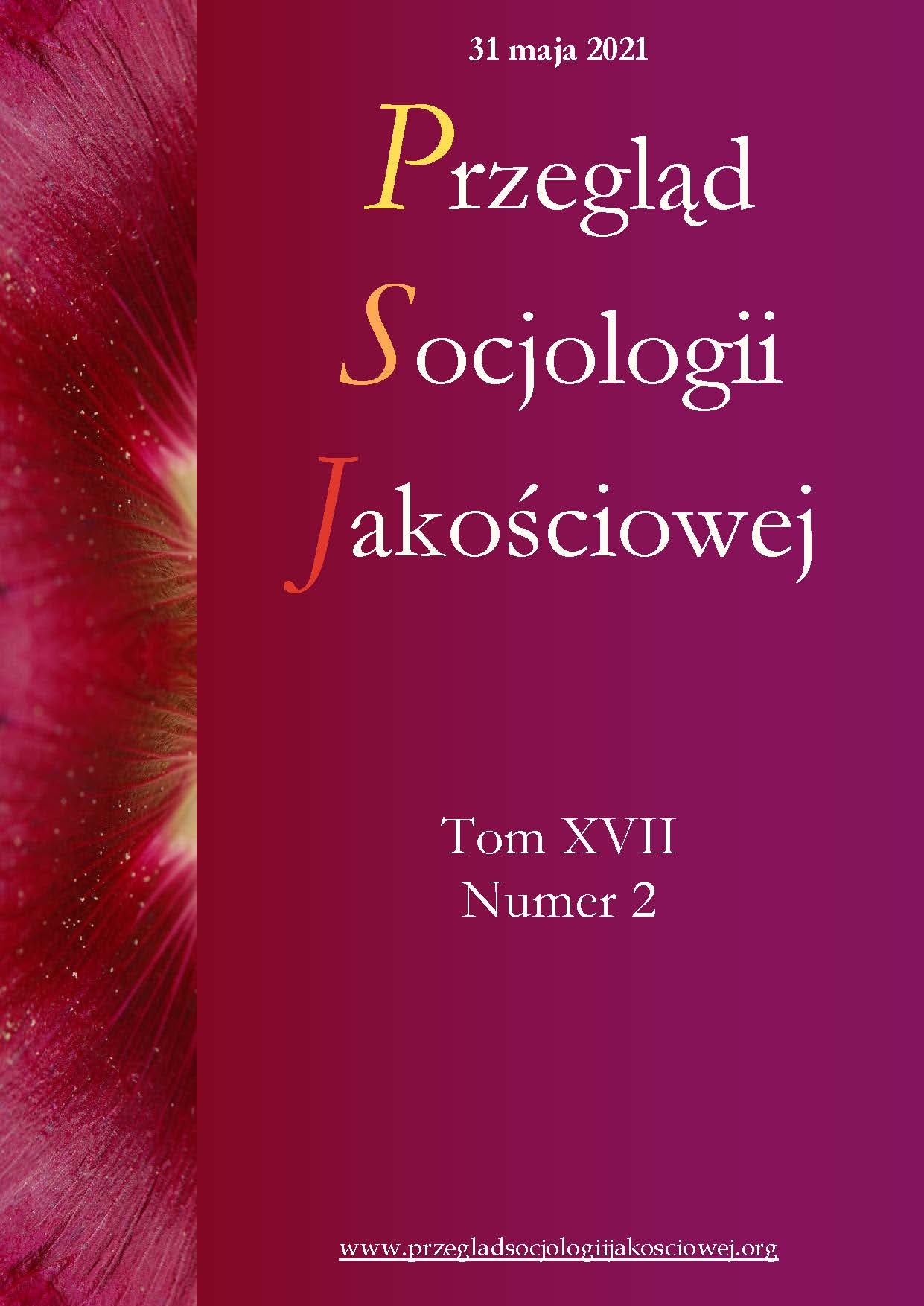Axionormative Models in the System of Science in Poland. The Sociological Perspective of Anomie
DOI:
https://doi.org/10.18778/1733-8069.17.2.02Keywords:
axionormative models, anomie, system of science, Poland, grounded theory methodology, sociology of science, humanistic coefficientAbstract
The article raises the problem of conflicting axionormative models, diagnosing the phenomenon of anomie in the system of science in Poland. The content of the paper is based on in-depth interviews with experts who work in the system of science (scientists, research project leaders, scientific editors-in-chief) and experts who cooperate with scientists (scientific journalists, administrative management staff). The article recalls the concepts of post-academic and post-normal science, ethical “declarative” models, as well as diverse models of “factual” cultures, demonstrated in many ethical and non-ethical actions. The article identifies areas of normative contrasts related to scientific policies which correspond with the processes of science globalization, as well as ways of doing research, additionally determined by scientific mobility. The presented paper deepens the understanding of the changing normative patters in the system of science from the grassroots perspective, with the application of the humanistic coefficient.
Downloads
References
Braxton John M. (1993) Deviancy from the Norms of Science: The Effects of Anomie and Alienation in the Academic Profession. „Research in Higher Education”, vol. 34, no. 2, s. 213–228.
Google Scholar
DOI: https://doi.org/10.1007/BF00992162
Bernburg Jón Gunnar (2019) Anomie Theory. „Oxford Research Encyclopedia of Criminology and Criminal Justice” [dostęp 1 maja 2021 r.]. Dostępny w Internecie: https://www.research-gate.net/publication/332057713_Anomie_Theory_Oxford_Research_Encyclopedia_of_Criminology_and_Criminal_Justice
Google Scholar
DOI: https://doi.org/10.1093/acrefore/9780190264079.013.244
Bujnicki Janusz M., Hasiów-Jaroszewska Beata, Wierzchoń Michał, red. (2015) Ekspertyza mobilności polskich naukowców. Warszawa: PAN [dostęp 21 lipca 2020 r.]. Dostępny w Internecie: https://ruj.uj.edu.pl/xmlui/bitstream/handle/item/20271/bujnicki_hasiow-jaroszewska_wierzchon_ekspertyza_mobilnosci_polskich_naukowcow.pdf?sequence=1&isAllowed=y
Google Scholar
Durkheim Émile (1999) O podziale pracy społecznej. Przełożył Krzysztof Wakar. Warszawa: Państwowe Wydawnictwo Naukowe.
Google Scholar
Funtowicz Silvio O., Ravetz Jerome R. (1991) A new scientific methodology for global environmental issues [w:] Robert Costanza, ed., Ecological economies: The science and management of sustainability. Nowy Jork: Columbia University Press, s. 137–152.
Google Scholar
Funtowicz Silvio O., Jerome R. Ravetz (1993) Science for the post-normal age. „Futures”, vol. 25, s. 739–755.
Google Scholar
DOI: https://doi.org/10.1016/0016-3287(93)90022-L
Gibbons Michael (1994) Transfer sciences: Management of distributed knowledge production. „Empirica”, vol. 21, s. 259–270.
Google Scholar
DOI: https://doi.org/10.1007/BF01697408
Goćkowski Janusz, red. (1994) Patologia i terapia życia naukowego. Kraków: Wydawnictwo Universitas.
Google Scholar
Habermas Jürgen (2019) Teoria działania komunikacyjnego, tom 1. Przełożył Andrzej Maciej Kaniowski. Warszawa: Wydawnictwo Naukowe PWN.
Google Scholar
Hałas Elżbieta (2016) Refleksyjny podmiot w świecie społecznym. O paradygmacie i założeniach socjologii interpretacyjnej. „Roczniki Nauk Społecznych”, t. 8(44), nr 4, s. 35–50.
Google Scholar
DOI: https://doi.org/10.18290/rns.2016.44.4-2
Jedlikowska Dorota (w druku) Analiza tematyczna wybranych artykułów naukoznawczych. „Zagadnienia Naukoznawstwa”.
Google Scholar
Kobylarek Aleksander (2016) Uniwersytet wobec konieczności paradygmatycznej zmiany. Wrocław: Argi.
Google Scholar
Konecki Krzysztof T. (2000) Studia z metodologii badań jakościowych. Teoria ugruntowana. Warszawa: Wydawnictwo Naukowe PWN.
Google Scholar
Kwiek Marek (2010) Transformacje uniwersytetu. Zmiany instytucjonalne i ewolucje polityki edukacyjnej w Europie. Poznań: Wydawnictwo Naukowe UAM.
Google Scholar
Kwiek Marek (2015) Podzielony uniwersytet. Od deinstytucjonalizacji do reinstytucjonalizacji misji badawczej polskich uczelni. „Nauka i Szkolnictwo Wyższe”, nr 2(46), s. 41–74.
Google Scholar
DOI: https://doi.org/10.14746/nsw.2015.2.2
Merton Robert K. (1973) The Sociology of Science. Theoretical and Empirical Investigations. Chicago, London: University Chicago Press.
Google Scholar
Musiał Kazimierz (2013) Uniwersytet na miarę swego czasu. Transformacja społeczna w dobie postindustrialnej a zmiany w szkolnictwie wyższym krajów nordyckich. Gdańsk: słowo/obraz/terytoria.
Google Scholar
Szafraniec Krystyna (2000) Anomia [w:] Witold Morawski i in., red., Encyklopedia Socjologii, tom 1. Warszawa: Oficyna Naukowa, s. 32–35.
Google Scholar
Sztompka Piotr (2005) Socjologia. Analiza społeczeństwa. Kraków: Wydawnictwo Znak.
Google Scholar
Sztompka Piotr (2007) Trust in Science: Robert K. Merton’s Inspirations. „Journal of Classical Sociology”, vol. 7, no. 2, s. 211–220.
Google Scholar
DOI: https://doi.org/10.1177/1468795X07078038
Szubka Tadeusz (2008) Patologie nauki polskiej. „Diametricos”, czerwiec 2008, t. 16, s. 118–121 [dostęp 21 lipca 2020 r.]. Dostępny w Internecie: file:///C:/Users/user/Downloads/307-Article%20Text-587-1-10-20131130.pdf
Google Scholar
Turnpenny John, Jones Mavis, Lorenzoni Irene (2011) Where Now for Post-Normal Science? A Critical Review of its Development, Definitions and Uses, Science. „Technology & Human Values”, vol. 36, no. 3, s. 287–306.
Google Scholar
DOI: https://doi.org/10.1177/0162243910385789
Weber Max (2002) Gospodarka i społeczeństwo. Zarys socjologii rozumiejącej. Przełożyła Dorota Lachowska. Warszawa: Wydawnictwo Naukowe PWN.
Google Scholar
Wieczorek Józef (2011) Patologie akademickie pod lupą NFA. Monitoring patologii polskiego środowiska akademickiego w 2011 roku. Kraków: Niezależne Forum Akademickie [dostęp 21 lipca 2020 r.]. Dostępny w Internecie: https://nfaetyka.files.wordpress.com/2012/01/patologie-akademickie-pod-lupc485-nfa.pdf
Google Scholar
Znaniecki Florian (2008) Metoda socjologii. Warszawa: Państwowe Wydawnictwo Naukowe.
Google Scholar
Downloads
Published
How to Cite
Issue
Section
License

This work is licensed under a Creative Commons Attribution-NonCommercial-NoDerivatives 4.0 International License.














